小说 the egg鸡蛋
the egg舍伍德安德森读后感
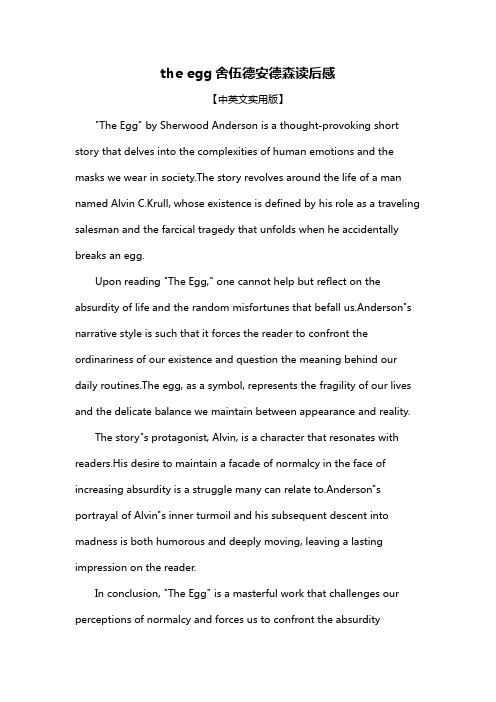
the egg舍伍德安德森读后感【中英文实用版】"The Egg" by Sherwood Anderson is a thought-provoking short story that delves into the complexities of human emotions and the masks we wear in society.The story revolves around the life of a man named Alvin C.Krull, whose existence is defined by his role as a traveling salesman and the farcical tragedy that unfolds when he accidentally breaks an egg.Upon reading "The Egg," one cannot help but reflect on the absurdity of life and the random misfortunes that befall us.Anderson"s narrative style is such that it forces the reader to confront the ordinariness of our existence and question the meaning behind our daily routines.The egg, as a symbol, represents the fragility of our lives and the delicate balance we maintain between appearance and reality.The story"s protagonist, Alvin, is a character that resonates with readers.His desire to maintain a facade of normalcy in the face of increasing absurdity is a struggle many can relate to.Anderson"s portrayal of Alvin"s inner turmoil and his subsequent descent into madness is both humorous and deeply moving, leaving a lasting impression on the reader.In conclusion, "The Egg" is a masterful work that challenges our perceptions of normalcy and forces us to confront the absurdityinherent in our lives.Sherwood Anderson"s storytelling ability is on full display, making this short story a memorable and thought-provoking read.舍伍德·安德森的《鸡蛋》是一部发人深省的短篇小说,它深入探讨了人类情感的复杂性和我们在社会中戴上的面具。
小人物悲剧命运的必然性——论舍伍德·安德森小说《鸡蛋》中“父亲”的悲剧命运
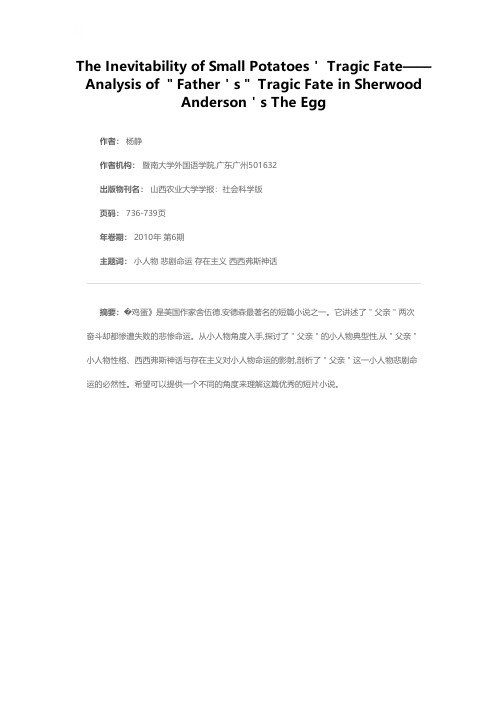
The Inevitability of Small Potatoes' Tragic Fate——Analysis of "Father's" Tragic Fate in Sherwood
Anderson's The Egg
作者: 杨静
作者机构: 暨南大学外国语学院,广东广州501632
出版物刊名: 山西农业大学学报:社会科学版
页码: 736-739页
年卷期: 2010年 第6期
主题词: 小人物 悲剧命运 存在主义 西西弗斯神话
摘要:�鸡蛋》是美国作家舍伍德.安德森最著名的短篇小说之一。
它讲述了"父亲"两次
奋斗却都惨遭失败的悲惨命运。
从小人物角度入手,探讨了"父亲"的小人物典型性,从"父亲"
小人物性格、西西弗斯神话与存在主义对小人物命运的影射,剖析了"父亲"这一小人物悲剧命
运的必然性。
希望可以提供一个不同的角度来理解这篇优秀的短片小说。
the egg文章主旨
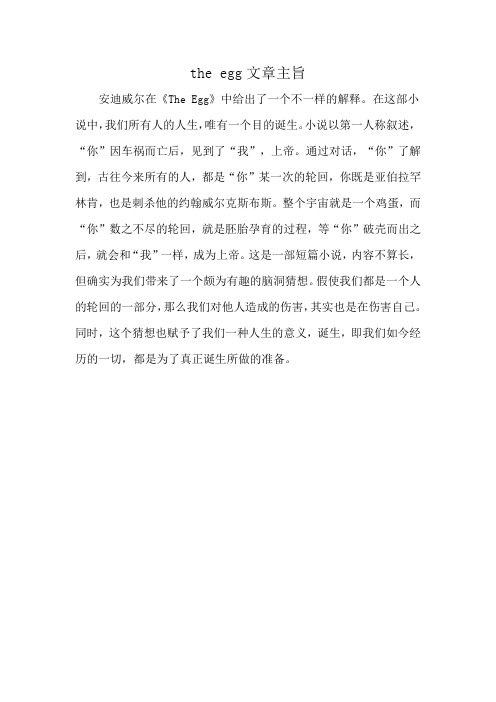
the egg文章主旨
安迪威尔在《The Egg》中给出了一个不一样的解释。
在这部小说中,我们所有人的人生,唯有一个目的诞生。
小说以第一人称叙述,“你”因车祸而亡后,见到了“我”,上帝。
通过对话,“你”了解到,古往今来所有的人,都是“你”某一次的轮回,你既是亚伯拉罕林肯,也是刺杀他的约翰威尔克斯布斯。
整个宇宙就是一个鸡蛋,而“你”数之不尽的轮回,就是胚胎孕育的过程,等“你”破壳而出之后,就会和“我”一样,成为上帝。
这是一部短篇小说,内容不算长,但确实为我们带来了一个颇为有趣的脑洞猜想。
假使我们都是一个人的轮回的一部分,那么我们对他人造成的伤害,其实也是在伤害自己。
同时,这个猜想也赋予了我们一种人生的意义,诞生,即我们如今经历的一切,都是为了真正诞生所做的准备。
文学导论the egg读后感
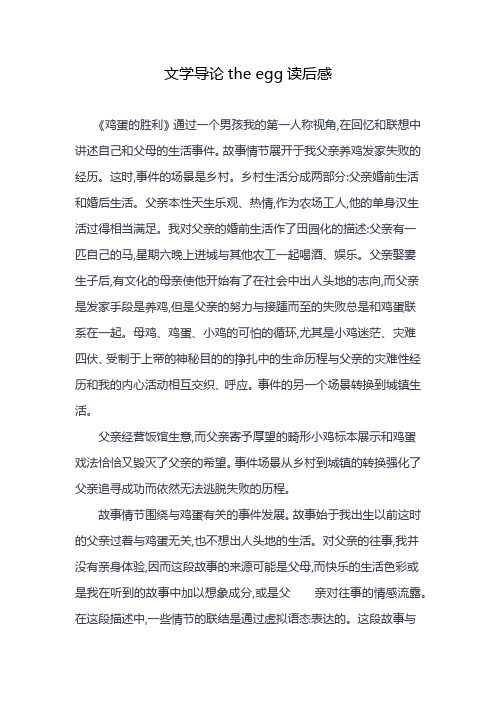
文学导论the egg读后感《鸡蛋的胜利》通过一个男孩我的第一人称视角,在回忆和联想中讲述自己和父母的生活事件。
故事情节展开于我父亲养鸡发家失败的经历。
这时,事件的场景是乡村。
乡村生活分成两部分:父亲婚前生活和婚后生活。
父亲本性天生乐观、热情,作为农场工人,他的单身汉生活过得相当满足。
我对父亲的婚前生活作了田园化的描述:父亲有一匹自己的马,星期六晚上进城与其他农工一起喝酒、娱乐。
父亲娶妻生子后,有文化的母亲使他开始有了在社会中出人头地的志向,而父亲是发家手段是养鸡,但是父亲的努力与接踵而至的失败总是和鸡蛋联系在一起。
母鸡、鸡蛋、小鸡的可怕的循环,尤其是小鸡迷茫、灾难四伏、受制于上帝的神秘目的的挣扎中的生命历程与父亲的灾难性经历和我的内心活动相互交织、呼应。
事件的另一个场景转换到城镇生活。
父亲经营饭馆生意,而父亲寄予厚望的畸形小鸡标本展示和鸡蛋戏法恰恰又毁灭了父亲的希望。
事件场景从乡村到城镇的转换强化了父亲追寻成功而依然无法逃脱失败的历程。
故事情节围绕与鸡蛋有关的事件发展。
故事始于我出生以前这时的父亲过着与鸡蛋无关,也不想出人头地的生活。
对父亲的往事,我并没有亲身体验,因而这段故事的来源可能是父母,而快乐的生活色彩或是我在听到的故事中加以想象成分,或是父亲对往事的情感流露。
在这段描述中,一些情节的联结是通过虚拟语态表达的。
这段故事与其后部分形成对比。
我的童年与父母的乡村生活以父亲在发家梦想的驱使下经营养鸡生意为情节,而结果是父亲生意失败,我则因为在养鸡场的生活而失去了幸福快乐的童年。
故事的主要情节部分详细讲述的父亲带着他的宝藏畸形小鸡标本离开乡下进城,而最终再次失败。
作为故事人物,父亲、母亲、我和乔。
凯恩也围绕鸡蛋产生鲜明对比。
父亲、母亲勤奋劳作。
父亲在母亲的影响下变得雄心勃勃,但他总有一些不切实际的奇思怪想。
他在实践自己计划时舞台恐惧症使他无法进入自己的角色,难怪在凯恩这样的局外人看来,父亲有些轻微的精神错乱,而不听摆布的鸡蛋使他的性格更具戏剧性。
the eggs 读书笔记
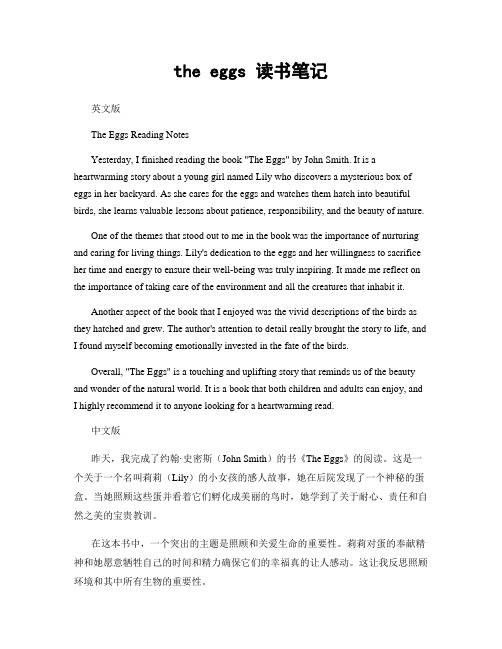
the eggs 读书笔记英文版The Eggs Reading NotesYesterday, I finished reading the book "The Eggs" by John Smith. It is a heartwarming story about a young girl named Lily who discovers a mysterious box of eggs in her backyard. As she cares for the eggs and watches them hatch into beautiful birds, she learns valuable lessons about patience, responsibility, and the beauty of nature.One of the themes that stood out to me in the book was the importance of nurturing and caring for living things. Lily's dedication to the eggs and her willingness to sacrifice her time and energy to ensure their well-being was truly inspiring. It made me reflect on the importance of taking care of the environment and all the creatures that inhabit it.Another aspect of the book that I enjoyed was the vivid descriptions of the birds as they hatched and grew. The author's attention to detail really brought the story to life, and I found myself becoming emotionally invested in the fate of the birds.Overall, "The Eggs" is a touching and uplifting story that reminds us of the beauty and wonder of the natural world. It is a book that both children and adults can enjoy, and I highly recommend it to anyone looking for a heartwarming read.中文版昨天,我完成了约翰·史密斯(John Smith)的书《The Eggs》的阅读。
The symbolism in The Egg《鸡蛋》中的象征意义-5页精选文档
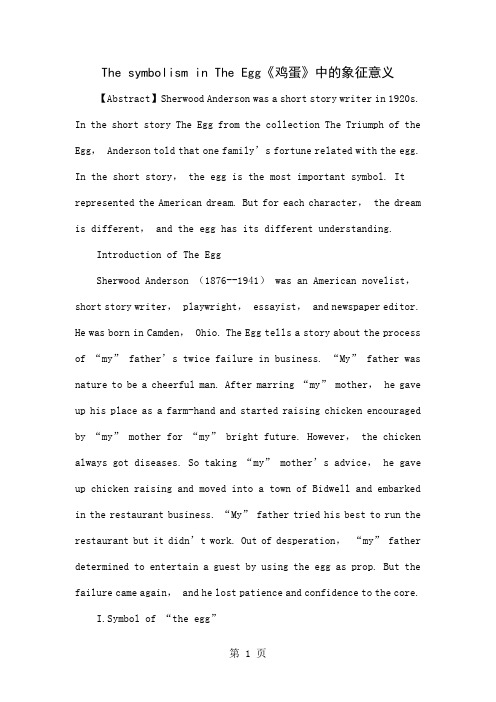
The symbolism in The Egg《鸡蛋》中的象征意义【Abstract】Sherwood Anderson was a short story writer in 1920s. In the short story The Egg from the collection The Triumph of the Egg,Anderson told that one family’s fortune related with the egg. In the short story, the egg is the most important symbol. It represented the American dream. But for each character, the dream is different, and the egg has its different understanding.Introduction of The EggSherwood Anderson (1876--1941) was an American novelist,short story writer, playwright, essayist, and newspaper editor. He was born in Camden, Ohio. The Egg tells a story about the process of “my” father’s twice failure in business. “My” father was nature to be a cheerful man. After marring “my” mother, he gave up his place as a farm-hand and started raising chicken encouraged by “my” mother for “my” bright future. However, the chicken always got diseases. So taking “my” mother’s advice, he gave up chicken raising and moved into a town of Bidwell and embarked in the re staurant business. “My” father tried his best to run the restaurant but it didn’t work. Out of desperation,“my” father determined to entertain a guest by using the egg as prop. But the failure came again, and he lost patience and confidence to the core.I.Symbol of “the egg”Sherwood Anderson lived in Midwestern America at the end of the nineteenth century and belonged to those who had watched how people pursued their American Dream and got disappointed before the First World War. American dream implies an opportunity for Americans to achieve prosperity through hard work. According to The Dream, this includes the opportunity for one's children to grow up and receive a good education. It is the opportunity to make individual choices without the prior restrictions that limited people according to their class, religion or ethnicity. As the most important symbol,the egg assumes association beyond those of the culinary. “The egg” is always related with the narrator’s family especially his father, but in each period it represents different symbolic meanings.A.Symbol of “The egg” for the motherAt the beginning of the story, the narrator tells us that his father is portrayed in a romanticized picture as a single farm-land. After his marrying, we are to ld that the boy’s mother was incurably ambitious for his father and himself. She is a school-teacher and reads of how Lincoln, Franklin, and other Americans rose from poverty to fame. Too much hope was loaded on them as well as on the egg. At first, she successfully introduces ambition into her husband’s idyllic existence. When the farm business turns out tobe a disaster, she decided the family moves into the town of Bidwell,Ohio. And there was another motive in it. That is his mother was ambitious for th e boy. She wanted him “to rise in the world, to get into a town school and become a man of the towns”. Since his father failed to realize his mother’s ambition, he became the last egg that was loaded with hopes. And there was another motive in it. That is his mother was ambitious for the boy. So for his mother,“the egg” is any hope or dream loaded on first his father, then the boy himself. B.Symbol of “The egg” for the narrator At the beginning of the story,the boy admits himself as “a gloomy man inclined to see the darker side of life,” and he attributes such inclination to his childhood on a chicken farm. When the family moves to the town, he temporarily gets happy. The boy could never love the egg or hate the egg, for it had been an inseparable part of his life. What he could do is to accept it and continue his life. The author chose the boy as the narrator, because he witnesses that the whole family’s dream broke down, and his father’s personal failure. The author wanted to tell us the boy was more influenced and suffered from the egg. For the boy, the egg symbolizes the futility of life itself.C.Symbol of “The egg” for the fatherIn the short story, the appearance of the egg is alwaysassociated with the fortune of the father. So the egg has the most symbolic meaning for his father. When he accepted his mother’s suggestion to set up a chicken farm, the egg is the rising of the American dream. He believes s that everyone who works hard can be in wealth. Then when the hens in the farm became sick and died,“our hopes for so much from a chicken and is so dreadfully disillusioned,” the egg is the broken American dream. After the farm business was fail, the father started to put the grotesque eggs in the glass bottle, regarding them as his fortune. At this moment, the egg is the freaky American dream.Ⅱ.ConclusionMentioning the symbolic meanings of the egg, I tend to view it from the mother’s,the father’s and the narrator’s angle. Sherwood Anderson adopted the boy’s point of view to make u s notice more. Childhood should be naive and happy, but this child could not feel any happiness after having witnessed so many deaths and grotesques. And he was deeply involved in the dreadful cycle. The “egg” was harmful to the next generation as well as to adults. If they failed to abandon it, the dreadful cycle would be continuing from generation to generation. The grotesque condition created the failure or unhappiness of most Americans. Only after the whole society establishes the right value, can the people who pursuitsthe American dream get closer to it.【Reference】[1]戴炜栋.文学导论[M].上海:上海外语教育出版社,2010.[2]杨金才.新编美国文学史(1914-1945)(第三卷)[M].上海:上海外语教育出版社,2002.[3]何婷.舍伍德?安德森短篇小说《鸡蛋》的象征主义手法的运用[J].武汉:湖北广播大学学报,2007(6).[4]Sherwood Anderson[EB/OL].2013-05-29.http://online-literature/sherwood-anderson熊俊娜(1990―),女,汉族,湖北人,现就读于西南大学外国语学院,主要研究方向:英语教育。
舍伍德·安德森短篇小说《鸡蛋》
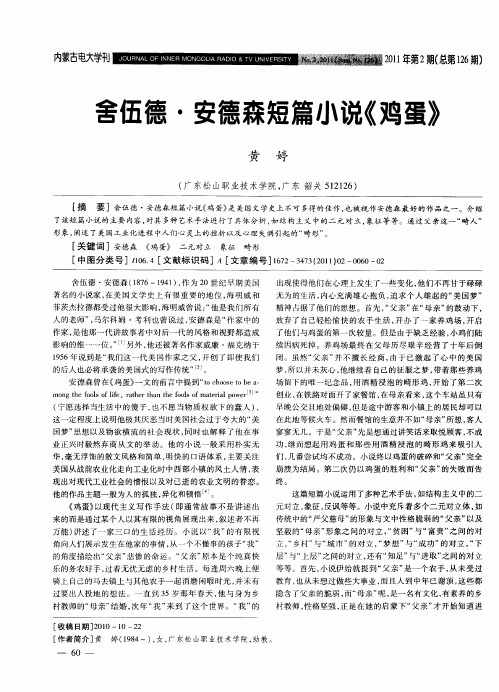
[ 关键 词 ]安德森 《 鸡蛋》 二元对立 象征 畸形
[ 中图分 类号 ]1 64[ 1 . 文献标 识码 ] 文章编 号 ]62 37 (0 10 — 00 0 0 A[ 17 — 432 1)2 06 — 2
舍 伍 德 ・ 德 森 (8 6—14 ) 作 为 2 安 17 91 , 0世 纪 早 期 美 国 著名 的小 说 家 , 美 国文 学 史 上 有 很 重 要 的地 位 , 明 威 和 在 海 出 现 使 得 他 们 在心 理 上 发 生 了一 些 变 化 , 们 不 再 甘 于 碌 碌 他
菲茨杰拉德都受过他很大影响 , 明威 曾说 : 他是我们所有 海 “ 人的老师 ” 马尔科姆 ・ 利也 曾说 过 , , 考 安德 森是“ 家中 的 作 作家 , 是他那 一代讲故事者 中对后一代 的风格 和视野都造成
影 响 的惟 一 一 位 。 … 另外 , 还被 著 名 作 家 威 廉 ・ 克 纳 于 ” 他 福
安德森 曾在《 蛋》 鸡 一文的前言中提到 “o hoe o ea tcos — tb
mo g t o l flf n hef oso ie,r te ha h o l fmae ilp we ’ ah rt n te fo so tra o r
场留下的唯一纪念 品 , 酒精 浸泡 的畸形 鸡 , 用 开始 了第 二次
元对立 , 象征 , 反讽等等 。小说中充斥着多个二元对 立体 , 如
《鸡蛋》美国梦幻灭的象征

《鸡蛋》美国梦幻灭的象征摘要:舍伍德·安德森(sherwood anderson)是20世纪早期美国著名的小说家,在美国文学史上有很重要的地位。
《鸡蛋》(the egg)是舍伍德的著名短篇小说之一,他成功的塑造了“我”的父亲这样的一个屡遭失败和挫折的一个畸人,尤其是他对象征主义创作手法的运用,娴熟的揭示了美国梦幻灭这一主题。
对美国现代小说的发展产生了一定影响。
关键词:安德森象征美国梦纵观美国文学,大家耳熟能详的作家脱口而出的总会有海明威,福克纳等,而舍伍德安德森则仅有多半人熟知。
然而,舍伍德安德森在美国文学史上的重要地位是不可忽视的。
福克纳在1956年接受采访时候说:“舍伍德安德森是我们一代作家之父。
”海明威曾说:“他是我们所有人的老师。
”[1]舍伍德·安德森(sherwood anderson)1876年9月13日出生在美国中西部俄亥俄州,他的成长时期正是美国文学史由现实主义向现代主义转变。
安德森在1919年发表短篇小说《小镇畸人》从而确立了他在美国文坛的地位。
而他与1921年出版的《鸡蛋的胜利》短篇小说集中《鸡蛋》被视为其最好的作品之一。
这篇短篇小说中“蛋”起着关键的作用,有着多重象征意义。
一.鸡蛋象征生活本身性情开朗的父亲听从母亲的建议,放弃农场帮手的工作,开始了一个独立事业养鸡场。
然而,养鸡场运营的并不乐观。
由于长期和母亲以及小鸡打交道,父亲饱受挫折,从一个天性乐观的人变成一个沉默寡言的人。
第一次创业失败后,父亲开餐馆,但却无人问津。
在试图用鸡蛋娱乐客人失败之后,父亲变得这么绝望,以致他在冲动之下打算毁掉所有的鸡蛋。
这就像一个人失败的时候,容易倾向于毁掉导致他失败的所有东西。
但当他来到母亲面前,他身上发生了一些变化。
在母亲的劝诱下,他说出楼下发生的事情。
然后,他把鸡蛋轻轻放在桌子上,在母亲身边哭得像个孩子。
是的,他很想毁掉所有的鸡蛋,他不想再和它们打交道,他不想再在这个世界上痛苦地活着。
The Egg全文翻译-Sherwood Anderson
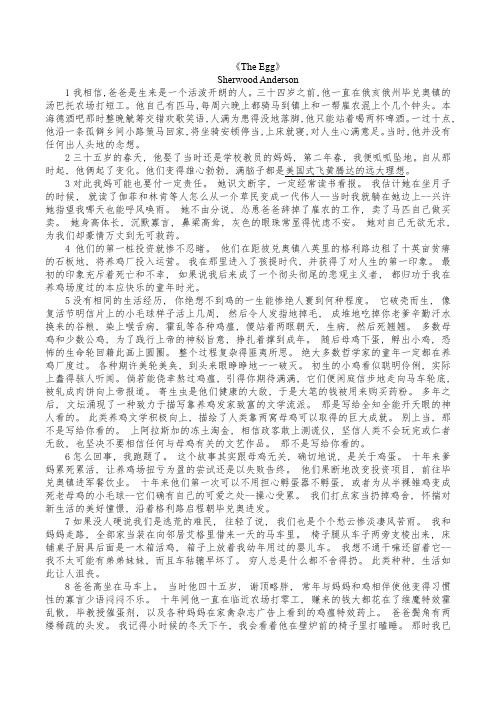
《The Egg》Sherwood Anderson1我相信,爸爸是生来是一个活泼开朗的人。
三十四岁之前,他一直在俄亥俄州毕兑奥镇的汤巴托农场打短工。
他自己有匹马,每周六晚上都骑马到镇上和一帮雇农混上个几个钟头。
本海德酒吧那时整晚觥筹交错欢歌笑语,人满为患得没地落脚,他只能站着喝两杯啤酒。
一过十点,他沿一条孤僻乡间小路策马回家,将坐骑安顿停当,上床就寝,对人生心满意足。
当时,他并没有任何出人头地的念想。
2三十五岁的春天, 他娶了当时还是学校教员的妈妈, 第二年春, 我便呱呱坠地。
自从那时起, 他俩起了变化。
他们变得雄心勃勃, 满脑子都是美国式飞黄腾达的远大理想。
3对此我妈可能也要付一定责任。
她识文断字, 一定经常读书看报。
我估计她在坐月子的时候, 就读了伽菲和林肯等人怎么从一介草民变成一代伟人--当时我就躺在她边上--兴许她指望我哪天也能呼风唤雨。
她不由分说, 怂恿爸爸辞掉了雇农的工作, 卖了马匹自己做买卖。
她身高体长, 沉默寡言, 鼻梁高耸, 灰色的眼珠常显得忧虑不安。
她对自己无欲无求, 为我们却豪情万丈到无可救药。
4他们的第一桩投资就惨不忍睹。
他们在距彼兑奥镇八英里的格利路边租了十英亩贫瘠的石板地, 将养鸡厂投入运营。
我在那里进入了孩提时代, 并获得了对人生的第一印象。
最初的印象充斥着死亡和不幸, 如果说我后来成了一个彻头彻尾的悲观主义者, 都归功于我在养鸡场度过的本应快乐的童年时光。
5没有相同的生活经历, 你绝想不到鸡的一生能惨绝人寰到何种程度。
它破壳而生, 像复活节明信片上的小毛球样子活上几周, 然后令人发指地掉毛, 成堆地吃掉你老爹辛勤汗水换来的谷粮, 染上喉舌病, 霍乱等各种鸡瘟, 傻站着两眼朝天, 生病, 然后死翘翘。
多数母鸡和少数公鸡, 为了践行上帝的神秘旨意, 挣扎着撑到成年。
随后母鸡下蛋, 孵出小鸡, 恐怖的生命轮回籍此画上圆圈。
整个过程复杂得匪夷所思。
绝大多数哲学家的童年一定都在养鸡厂度过。
the egg赏析

the egg赏析《鸡蛋的胜利》被认为是安德森的传世佳作之一。
该小说以第一人称的方式通过一个男孩之口,在回忆和联想中讲述了自己和父母的生活事件,从中我们感受到了美国梦对人们的深刻影响以及人情冷漠。
“父亲是怎样异化”的过程可以从内在因素和和外在因素两个主要方面分析。
\"The Triumph of the Egg\" is considered one of Anderson's masterpieces. Through the mouth of a boy in the first person, the novel tells the life events of himself and his parents in memories and associations, from which we feel the profound influence of the American dream on people and the indifference of human feelings. The process of \"how the father is alienated\" can be analyzed from two main aspects: internal factors and external factors.首先,在异化人性的内在因素方面,要探究父亲是怎样从一个正常人而变成一个畸形人需要从探究父亲本身开始。
结婚前父亲是一个简单快乐的人,具有小镇人的淳朴的善良的品性。
父亲从结婚后开始变得雄心勃勃,美国梦占据了他的心。
父亲首先养鸡,但养鸡非常艰难,父亲失败了;“畸形鸡”出现后,父亲心理开始异化,他希望通过展览畸形鸡的方法获取财富;后来父亲又开始努力经营旅馆,通过娱乐于客人的方法而使生意好转:但是最终他失败了。
从一次次的失败可以看出父亲随着鸡的畸形自己也开始变得异化。
the egg 赏析(双语)

the egg 赏析(双语)短篇科幻小说《蛋》,英文The Egg,由美国程序员安迪·威尔(Andy Weir)创作。
这篇关于宇宙意识、生命、死亡和轮回的小说,也被称为哲学寓言、宗教寓言。
但作者是地道的科幻作家,他的另一部作品就是被拍成电影的《火星救援》。
以下为小说《蛋》译文及英文全文。
《蛋》(宇宙之卵)安迪·威尔你在回家的路上,死了。
是车祸。
没有很离奇,但仍然致命。
你留下了妻子和两个孩子。
你死得并不痛苦。
救护员尽力去抢救,但没有成功。
你的身体惨不忍睹,还不如死了,相信我。
这时候,你遇到了我。
“怎……怎么回事?”你问,“这是哪?”“你死了。
”我实话实说,没必要委婉。
“一辆……一辆卡车,它失控了……”“没错。
”我说。
“我……我死了?”“是的。
但别难过,每个人都会死。
”我说。
你环顾四周,一片虚空,只有你和我。
“这是什么地方?”你问,“死后的世界?”“可以这么说吧。
”我说。
“你是上帝?”你问。
“对,”我回答,“我是上帝。
”“我的孩子们……还有我太太……”你说。
“怎么了?”“他们没事吧?”“这一点我喜欢,”我说,“你死了,还关心你的家人,在这里这是好事。
”你困惑地看着我。
对你而言,我看起来并不像神,更像一个普通男人,亦或一个女人。
一个模糊又权威的形象。
也许,比起万能的神,我更像是一位老师。
“别担心,”我说,“他们都会好起来的。
你在孩子们的记忆中会是完美的,他们还没成长到叛逆你的年龄。
你太太会在人前恸哭,但其实内心里却如释重负。
平心而论,你们的婚姻早已破裂了。
她会对自己松一口气的心情感到内疚,对你来说,这或许算是一点安慰。
”“哦,”你说,“那么,现在呢?我是上天堂还是下地狱,或者去别的什么地方?”“都不是,”我说,“你会重新投胎。
”“啊,”你说,“原来轮回转世是真的?”“所有宗教都以不同的方式合理着,”我说,“跟我走吧。
”你跟着我,在虚空中穿行,“我们去哪里?”“不去哪里,”我说,“边走边聊就好。
theegg赏析
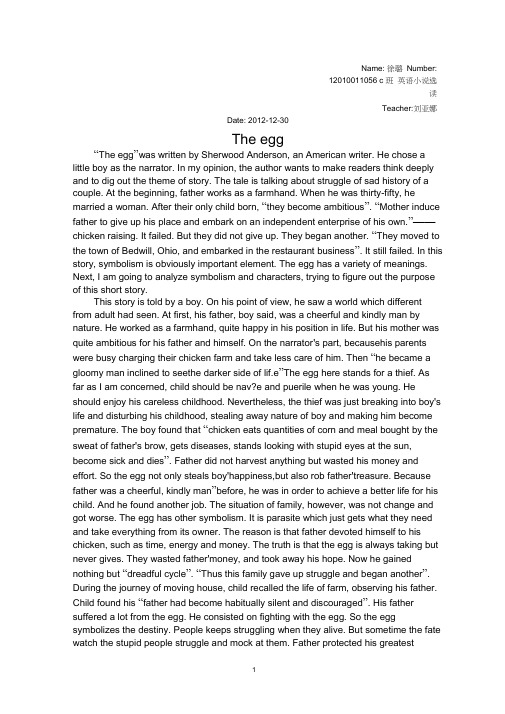
Name: 徐璐Number:12010011056 c 班英语小说选读Teacher:刘亚娜Date: 2012-12-30The egg“The egg”was written by Sherwood Anderson, an American writer. He chose a little boy as the narrator. In my opinion, the author wants to make readers think deeply and to dig out the theme of story. The tale is talking about struggle of sad history of a couple. At the beginning, father works as a farmhand. When he was thirty-fifty, he married a woman. After their only child born, “they become ambitious”. “Mother induce father to give up his place and embark on an independent enterprise of his own.”——chicken raising. It failed. But they did not give up. They began another. “They moved to the town of Bedwill, Ohio, and embarked in the restaurant business”. It still failed. In this story, symbolism is obviously important element. The egg has a variety of meanings. Next, I am going to analyze symbolism and characters, trying to figure out the purpose of this short story.This story is told by a boy. On his point of view, he saw a world which different from adult had seen. At first, his father, boy said, was a cheerful and kindly man by nature. He worked as a farmhand, quite happy in his position in life. But his mother was quite ambitious for his father and himself. On the narrator's part, becausehis parents were busy charging their chicken farm and take less care of him. Then “he became a gloomy man inclined to seethe darker side of lif.e”The egg here stands for a thief. As far as I am concerned, child should be nav?e and puerile when he was young. He should enjoy his careless childhood. Nevertheless, the thief was just breaking into boy's life and disturbing his childhood, stealing away nature of boy and making him become premature. The boy found that “chicken eats quantities of corn and meal bought by the sweat of father's brow, gets diseases, stands looking with stupid eyes at the sun, become sick and dies”. Father did not harvest anything but wasted his money and effort. So the egg not only steals boy'happiness,but also rob father'treasure. Because father was a cheerful, kindly man”before, he was in order to achieve a better life for his child. And he found another job. The situation of family, however, was not change and got worse. The egg has other symbolism. It is parasite which just gets what they need and take everything from its owner. The reason is that father devoted himself to his chicken, such as time, energy and money. The truth is that the egg is always taking but never gives. They wasted father'money, and took away his hope. Now he gained nothing but “dreadful cycle”. “Thus this family gave up struggle and began another”. During the journey of moving house, child recalled the life of farm, observing his father. Child found his “father had become habitually silent and discouraged”. His father suffered a lot from the egg. He consisted on fighting with the egg. So the egg symbolizes the destiny. People keeps struggling when they alive. But sometime the fate watch the stupid people struggle and mock at them. Father protected his greatesttreasure—grotsques throughout a journey. Here, grotesque's symbolic meaning to predict his dream would not happen and tell the reader father was mad. Fathe'rs behavior seems defend our destiny against invasion carefully. They rented an empty store building as a restaurant opposite the railroad station. Mother selected this place so as to send her boy into a town and became a man of the towns one day. She pin her hopes on him. Father still put expectation on the egg. He wondered if he adopts “a cheerful outlook on life ”. And he also dreamed of entertaining their gusts whether there is an opportunity. He never abandons the chance of controlling the egg as he wants to keep the destiny under the control. One day in the evening, there was rare chance which a gust came to visit. Father wouldn 't, of course, let such a perfect opportunity slip away. Then father exhibited the grotsques. But “his visitor was made a little ill by the sight if the body of terribly deformed bird floating in the alcohol in the bottle and got up to go. ”Father began to do a trick with an egg and wanted to catch visitor 'attention. It failed. Visitor laughed at him and thought he was mildly insane and harmless. At last, father lost face and reputation. The egg won. Father lost the fate and he sadly admitted.After I had read the short story, I feel sympathetic for the father and child. They are made fool of the egg. In addition, the egg stand forAmerican 'dream. Because the experience of the author make him raise a deeply thought, and to pick up his pen so as to wake up people who are obsessed with making their American dream come true. At worse, this has lead to people not thinking for themselves, and simply following public opinion. But the reality is quite cruel and totally different.。
英语文学概括the egg读后感
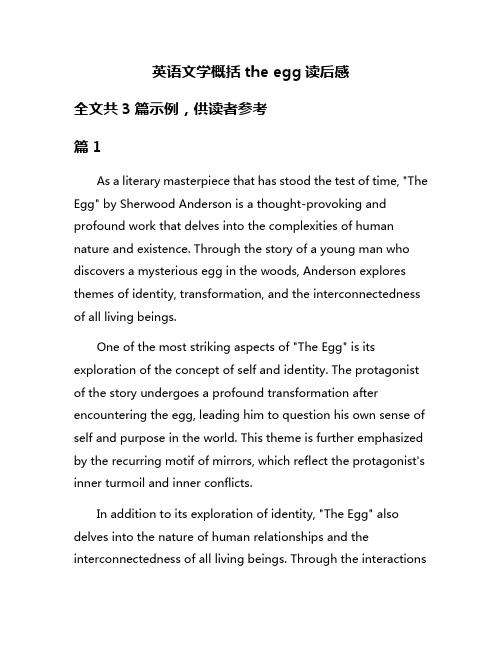
英语文学概括the egg读后感全文共3篇示例,供读者参考篇1As a literary masterpiece that has stood the test of time, "The Egg" by Sherwood Anderson is a thought-provoking and profound work that delves into the complexities of human nature and existence. Through the story of a young man who discovers a mysterious egg in the woods, Anderson explores themes of identity, transformation, and the interconnectedness of all living beings.One of the most striking aspects of "The Egg" is its exploration of the concept of self and identity. The protagonist of the story undergoes a profound transformation after encountering the egg, leading him to question his own sense of self and purpose in the world. This theme is further emphasized by the recurring motif of mirrors, which reflect the protagonist's inner turmoil and inner conflicts.In addition to its exploration of identity, "The Egg" also delves into the nature of human relationships and the interconnectedness of all living beings. Through the interactionsbetween the protagonist and the various characters he encounters, Anderson illustrates how our actions and choices can have far-reaching consequences on others. This theme is captured beautifully in the closing lines of the story, where the protagonist realizes that we are all connected by a common thread of humanity.Furthermore, "The Egg" serves as a powerful meditation on the cyclical nature of life and death. The egg itself symbolizes the cycle of birth, death, and rebirth, as well as the potential for transformation and renewal. By engaging with these themes, Anderson prompts readers to reflect on their own mortality and the fleeting nature of existence.Overall, "The Egg" is a timeless work of literature that continues to resonate with readers today. Through its exploration of identity, interconnectedness, and the cyclical nature of life, Anderson offers a profound meditation on the human experience. Whether read as a philosophical allegory or a simple tale of self-discovery, "The Egg" remains a poignant and enduring piece of English literature.篇2"The Egg" is a thought-provoking and introspective short story written by Andy Weir. This fictional piece presents a unique and philosophical perspective on the concept of life, death, and the interconnectedness of all beings.The story follows a man who dies in a car accident and finds himself in a conversation with a deity-like entity that reveals a shocking truth: every person who has ever lived or will ever live is actually the same soul experiencing different lives and perspectives. The entity explains that this soul is gradually evolving and becoming more enlightened through each reincarnation, ultimately leading to a state of complete understanding and oneness.I found "The Egg" to be a fascinating and thought-provoking read that challenges traditional views on life, death, and the human experience. It forces readers to question their own beliefs and consider the possibility of a higher purpose or interconnectedness in the universe. The story's central theme of unity and empathy resonated with me, as it highlights the importance of compassion and understanding towards others, seeing them as extensions of oneself.Overall, "The Egg" is a compelling and thought-provoking piece of literature that encourages readers to reflect on theirown existence and the interconnected nature of humanity. It serves as a reminder to treat others with kindness and respect, as we are all part of the same universal soul experiencing different paths and perspectives.篇3"The Egg" is a thought-provoking short story written by Andy Weir. It delves into the idea of reincarnation and the interconnectedness of all human beings. The story follows a man who dies in a car accident and meets God in the afterlife, only to discover that he is actually reincarnating into different lives in order to experience all aspects of humanity.One of the most compelling aspects of "The Egg" is its exploration of the concept of unity. The story suggests that all human beings are connected on a fundamental level, and that we are all essentially the same person living different lives. This idea challenges the traditional notion of individuality and highlights the importance of empathy and understanding towards others.The story also raises questions about the nature of existence and the purpose of life. By presenting a scenario where the protagonist is reincarnated multiple times in order to learn andgrow, "The Egg" suggests that life is a journey of self-discovery and personal development. It encourages readers to reflect on their own lives and consider what lessons they may need to learn in order to become their best selves.Overall, "The Egg" is a captivating and philosophically rich story that prompts readers to think deeply about the complexities of human existence. It challenges conventional beliefs about individuality and encourages a more compassionate and interconnected view of the world. After reading this story, I was left contemplating the nature of my own existence and the ways in which I am connected to others. It is a story that will linger in my mind for a long time, prompting me to consider the implications of its profound message.。
The Egg by Sherwood Anderson 中英对照
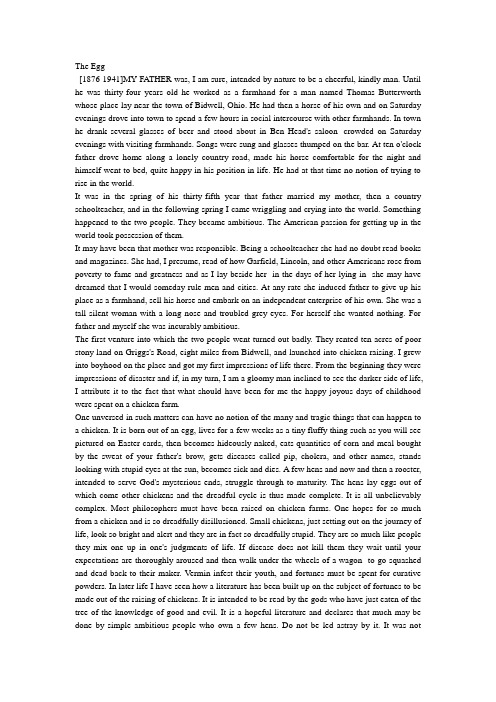
The Egg[1876-1941]MY FATHER was, I am sure, intended by nature to be a cheerful, kindly man. Until he was thirty-four years old he worked as a farmhand for a man named Thomas Butterworth whose place lay near the town of Bidwell, Ohio. He had then a horse of his own and on Saturday evenings drove into town to spend a few hours in social intercourse with other farmhands. In town he drank several glasses of beer and stood about in Ben Head's saloon--crowded on Saturday evenings with visiting farmhands. Songs were sung and glasses thumped on the bar. At ten o'clock father drove home along a lonely country road, made his horse comfortable for the night and himself went to bed, quite happy in his position in life. He had at that time no notion of trying to rise in the world.It was in the spring of his thirty-fifth year that father married my mother, then a country schoolteacher, and in the following spring I came wriggling and crying into the world. Something happened to the two people. They became ambitious. The American passion for getting up in the world took possession of them.It may have been that mother was responsible. Being a schoolteacher she had no doubt read books and magazines. She had, I presume, read of how Garfield, Lincoln, and other Americans rose from poverty to fame and greatness and as I lay beside her--in the days of her lying-in--she may have dreamed that I would someday rule men and cities. At any rate she induced father to give up his place as a farmhand, sell his horse and embark on an independent enterprise of his own. She was a tall silent woman with a long nose and troubled grey eyes. For herself she wanted nothing. For father and myself she was incurably ambitious.The first venture into which the two people went turned out badly. They rented ten acres of poor stony land on Griggs's Road, eight miles from Bidwell, and launched into chicken raising. I grew into boyhood on the place and got my first impressions of life there. From the beginning they were impressions of disaster and if, in my turn, I am a gloomy man inclined to see the darker side of life, I attribute it to the fact that what should have been for me the happy joyous days of childhood were spent on a chicken farm.One unversed in such matters can have no notion of the many and tragic things that can happen to a chicken. It is born out of an egg, lives for a few weeks as a tiny fluffy thing such as you will see pictured on Easter cards, then becomes hideously naked, eats quantities of corn and meal bought by the sweat of your father's brow, gets diseases called pip, cholera, and other names, stands looking with stupid eyes at the sun, becomes sick and dies. A few hens and now and then a rooster, intended to serve God's mysterious ends, struggle through to maturity. The hens lay eggs out of which come other chickens and the dreadful cycle is thus made complete. It is all unbelievably complex. Most philosophers must have been raised on chicken farms. One hopes for so much from a chicken and is so dreadfully disillusioned. Small chickens, just setting out on the journey of life, look so bright and alert and they are in fact so dreadfully stupid. They are so much like people they mix one up in one's judgments of life. If disease does not kill them they wait until your expectations are thoroughly aroused and then walk under the wheels of a wagon--to go squashed and dead back to their maker. Vermin infest their youth, and fortunes must be spent for curative powders. In later life I have seen how a literature has been built up on the subject of fortunes to be made out of the raising of chickens. It is intended to be read by the gods who have just eaten of the tree of the knowledge of good and evil. It is a hopeful literature and declares that much may be done by simple ambitious people who own a few hens. Do not be led astray by it. It was notwritten for you. Go hunt for gold on the frozen hills of Alaska, put your faith in the honesty of a politician, believe if you will that the world is daily growing better and that good will triumph over evil, but do not read and believe the literature that is written concerning the hen. It was not written for you.I, however, digress. My tale does not primarily concern itself with the hen. If correctly told it will center on the egg. For ten years my father and mother struggled to make our chicken farm pay and then they gave up that struggle and began another. They moved into the town of Bidwell, Ohio and embarked in the restaurant business. After ten years of worry with incubators that did not hatch, and with tiny--and in their own way lovely--balls of fluff that passed on into semi-naked pullerhood and from that into dead henhood, we threw all aside and packing our belongings on a wagon drove down Griggs's Road toward Bidwell, a tiny caravan of hope looking for a new place from which to start on our upward journey through life.We must have been a sad looking lot, not, I fancy, unlike refugees fleeing from a battlefield. Mother and I walked in the road. The wagon that contained our goods had been borrowed for the day from Mr. Albert Griggs, a neighbor. Out of its sides stuck the legs of cheap chairs and at the back of the pile of beds, tables, and boxes filled with kitchen utensils was a crate of live chickens, and on top of that the baby carriage in which I had been wheeled about in my infancy. Why we stuck to the baby carriage I don't know. It was unlikely other children would be born and the wheels were broken. People who have few possessions cling tightly to those they have. That is one of the facts that make life so discouraging.Father rode on top of the wagon. He was then a bald-headed man of forty-five, a little fat and from long association with mother and the chickens he had become habitually silent and discouraged. All during our ten years on the chicken farm he had worked as a laborer on neighboring farms and most of the money he had earned had been spent for remedies to cure chicken diseases, on Wilmer's White Wonder Cholera Cure or Professor Bidlow's Egg Producer or some other preparations that mother found advertised in the poultry papers. There were two little patches of hair on father's head just above his ears. I remember that as a child I used to sit looking at him when he had gone to sleep in a chair before the stove on Sunday afternoons in the winter. I had at that rime already begun to read books and have notions of my own and the bald path that led over the top of his head was, I fancied, something like a broad road, such a road as Caesar might have made on which to lead his legions out of Rome and into the wonders of an unknown world. The tufts of hair that grew above father's ears were, I thought, like forests. I fell into a half-sleeping, half-waking state and dreamed I was a tiny thing going along the road into a far beautiful place where there were no chicken farms and where life was a happy eggless affair.One might write a book concerning our flight from the chicken farm into town. Mother and I walked the entire eight miles--she to be sure that nothing fell from the wagon and I to see the wonders of the world. On the seat of the wagon beside father was his greatest treasure. I will tell you of that.On a chicken farm where hundreds and even thousands of chickens come out of eggs, surprising things sometimes happen. Grotesques are born out of eggs as out of people. The accident does not often occur--perhaps once in a thousand births. A chicken is, you see, born that has four legs, two pairs of wings, two heads or what not. The things do not live. They go quickiy back to the hand of their maker that has for a moment trembled. The fact that the poor little things could not live was one of the tragedies of life to father. He had some sort of notion that if he could but bring intohenhood or roosterhood a five-legged hen or a two-headed rooster his fortune would be made. He dreamed of taking the wonder about to county fairs and of growing rich by exhibiting it to other farmhands.At any rate he saved all the little monstrous things that had been born on our chicken farm. They were preserved in alcohol and put each in its own glass bottle. These he had carefully put into a box and on our journey into town it was carried on the wagon seat beside him. He drove the horses with one hand and with the other clung to the box. When we got to our destination the box was taken down at once and the bottles removed. All during our days as keepers of a restaurant in the town of Bidwell, Ohio, the grotesques in their little glass bottles sat on a shelf back of the counter. Mother sometimes protested but father was a rock on the subject of his treasure. The grotesques were, he declared, valuable. People, he said, liked to look at strange and wonderful things.Did I say that we embarked in the restaurant business in the town of Bidwell, Ohio? I exaggerated a little. The town itself lay at the foot of a low hill and on the shore of a small river. The railroad did not run through the town and the station was a mile away to the north at a place called Pickleville. There had been a cider mill and pickle factory at the station, but before the time of our coming they had both gone out of business. In the morning and in the evening busses came down to the station along a road called Turner's Pike from the hotel on the main street of Bidwell. Our going to the out-of-the-way place to embark in the restaurant business was mother's idea. She talked of it for a year and then one day went off and rented an empty store building opposite the railroad station. It was her idea that the restaurant would be profitable. Travelling men, she said, would be always waiting around to take trains out of town and town people would come to the station to await incoming trains. They would come to the restaurant to buy pieces of pie and drink coffee. Now that I am older I know that she had another motive in going. She was ambitious for me. She wanted me to rise in the world, to get into a town school and become a man of the towns. At Pickleville father and mother worked hard as they always had done. At first there was the necessity of putting our place into shape to be a restaurant. That took a month. Father built a shelf on which he put tins of vegetables. He painted a sign on which he put his name in large red letters. Below his name was the sharp command--"EAT HERE"--that was so seldom obeyed. A showcase was bought and filled with cigars and tobacco. Mother scrubbed the floor and the walls of the room. I went to school in the town and was glad to be away from the farm and from the presence of the discouraged, sad-looking chickens. Still I was not very joyous. In the evening I walked home from school along Turner's Pike and remembered the children I had seen playing in the town school yard. A troop of little girls had gone hopping about and singing. I tried that. Down along the frozen road I went hopping solemnly on one leg. "Hippity hop to the barber shop," I sang shrilly. Then I stopped and looked doubtfully about. I was afraid of being seen in my gay mood. It must have seemed to me that I was doing a thing that should not be done by one who, like myself, had been raised on a chicken farm where death was a daily visitor.Mother decided that our restaurant should remain open at night. At ten in the evening a passenger train went north past our door followed by a local freight. The freight crew had switching to do in Pickleville and when the work was done they came to our restaurant for hot coffee and food. Sometimes one of them ordered a fried egg. In the morning at four they returned northbound and again visited us. A little trade began to grow up. Mother slept at night and during the day tended the restaurant and fed our boarders while father slept. He slept in the same bed mother had occupied during the night and I went off to the town of Bidwell and to school. During the longnights, while mother and I slept, father cooked meats that were to go into sandwiches for the lunch baskets of our boarders. Then an idea in regard to getting up in the world came into his head. The American spirit took hold of him. He also became ambitious.In the long nights when there was little to do father had time to think. That was his undoing. He decided that he had in the past been an unsuccessful man because he had not been cheerful enough and that in the future he would adopt a cheerful outlook on life. In the early morning he came upstairs and got into bed with mother. She woke and the two talked. From my bed in the corner I listened.It was father's idea that both he and mother should try to entertain the people who came to eat at our restaurant. I cannot now remember his words, but he gave the impression of one about to become in some obscure way a kind of public entertainer. When people, particularly young people from the town of Bidwell, came into our place, as on very rare occasions they did, bright entertaining conversation was to be made. From father's words I gathered that something of the jolly innkeeper effect was to be sought. Mother must have been doubtful from the first, but she said nothing discouraging. It was father's notion that a passion for the company of himself and mother would spring up in the breasts of the younger people of the town of Bidwell. In the evening bright happy groups would come singing down Turner's Pike. They would troop shouting with joy and laughter into our place. There would be song and festivity. I do not mean to give the impression that father spoke so elaborately of the matter. He was as I have said an uncommunicative man. "They want some place to go. I tell you they want some place to go," he said over and over. That was as far as he got. My own imagination has filled in the blanks.For two or three weeks this notion of father's invaded our house. We did not talk much but in our daily lives tried earnestly to make smiles take the place of glum looks. Mother smiled at the boarders and I, catching the infection, smiled at our cat. Father became a little feverish in his anxiety to please. There was no doubt lurking somewhere in him a touch of the spirit of the showman. He did not waste much of his ammunition on the railroad men he served at night but seemed to be waiting for a young man or woman from Bidwell to come in to show what he could do. On the counter in the restaurant there was a wire basket kept always filled with eggs, and it must have been before his eyes when the idea of being entertaining was born in his brain. There was something pre-natal about the way eggs kept themselves connected with the development of his idea. At any rate an egg ruined his new impulse in life. Late one night I was awakened by a roar of anger coming from father's throat. Both mother and I sat upright in our beds. With trembling hands she lighted a lamp that stood on a table by her head. Downstairs the front door of our restaurant went shut with a bang and in a few minutes father tramped up the stairs. He held an egg in his hand and his hand trembled as though he were having a chill. There was a half insane light in his eyes. As he stood glaring at us I was sure he intended throwing the egg at either mother or me. Then he laid it gently on the table beside the lamp and dropped on his knees beside mother's bed. He began to cry like a boy and I, carried away by his grief, cried with him. The two of us filled the little upstairs room with our wailing voices. It is ridiculous, but of the picture we made I can remember only the fact that mother's hand continually stroked the bald path that ran across the top of his head. I have forgotten what mother said to him and how she induced him to tell her of what had happened downstairs. His explanation also has gone out of my mind. I remember only my own grief and fright and the shiny path over father's head glowing in the lamplight as he knelt by the bed.As to what happened downstairs. For some unexplainable reason I know the story as well as though I had been a witness to my father's discomfiture. One in time gets to know many unexplainable things. On that evening young Joe Kane, son of a merchant of Bidwell, came to Pickleville to meet his father, who was expected on the ten o'clock evening train from the south. The train was three hours late and Joe came into our place to loaf about and to wait for its arrival. The local freight train came in and the freight crew were fed. Joe was left alone in the restaurant with father.From the moment he came into our place the Bidwell young man must have been puzzled by my father's actions. It was his notion that father was angry at him for hanging around. He noticed that the restaurant keeper was apparently disturbed by his presence and he thought of going out. However, it began to rain and he did not fancy the long walk to town and back. He bought a five-cent cigar and ordered a cup of coffee. He had a newspaper in his pocket and took it out and began to read. "I'm waiting for the evening train. It's late," he said apologetically.For a long time father, whom Joe Kane had never seen before, remained silently gazing at his visitor. He was no doubt suffering from an attack of stage fright. As so often happens in life he had thought so much and so often of the situation that now confronted him that he was somewhat nervous in its presence.For one thing, he did not know what to do with his hands. He thrust one of them nervously over the counter and shook hands with Joe Kane. "How-de-do," he said. Joe Kane put his newspaper down and stared at him. Father's eye lighted on the basket of eggs that sat on the counter and he began to talk. "Well," he began hesitatingly, "well, you have heard of Christopher Columbus, eh?" He seemed to be angry. "That Christopher Columbus was a cheat," he declared emphatically. "He talked of making an egg stand on its end. He talked, he did, and then he went and broke the end of the egg."My father seemed to his visitor to be beside himself at the duplicity of Christopher Columbus. He muttered and swore. He declared it was wrong to teach children that Christopher Columbus was a great man when, after all, he cheated at the critical moment. He had declared he would make an egg stand on end and then when his bluff had been called he had done a trick. Still grumbling at Columbus, father took an egg from the basket on the counter and began to walk up and down. He rolled the egg between the palms of his hands. He smiled genially. He began to mumble words regarding the effect to be produced on an egg by the electricity that comes out of the human body. He declared that without breaking its shell and by virtue of rolling it back and forth in his hands he could stand the egg on its end. He explained that the warmth of his hands and the gentle rolling movement he gave the egg created a new center of gravity, and Joe Kane was mildly interested. "I have handled thousands of eggs," father said. "No one knows more about eggs than I do."He stood the egg on the counter and it fell on its side. He tried the trick again and again, each time rolling the egg between the palms of his hands and saying the words regarding the wonders of electricity and the laws of gravity. When after a half hour's effort he did succeed in making the egg stand for a moment, he looked up to find that his visitor was no longer watching. By the time he had succeeded in calling Joe Kane's attention to the success of his effort, the egg had again rolled over and lay on its side.Afire with the showman's passion and at the same time a good deal disconcerted by the failure of his first effort, father now took the bottles containing the poultry monstrosities down from their place on the shelf and began to show them to his visitor. "How would you like to have seven legsand two heads like this fellow?" he asked, exhibiting the most remarkable of his treasures. A cheerful smile played over his face. He reached over the counter and tried to slap Joe Kane on the shoulder as he had seen men do in Ben Head's saloon when he was a young farmhand and drove to town on Saturday evenings. His visitor was made a little ill by the sight of the body of the terribly deformed bird floating in the alcohol in the bottle and got up to go. Coming from behind the counter, father took hold of the young man's arm and led him back to his seat. He grew a little angry and for a moment had to turn his face away and force himself to smile. Then he put the bottles back on the shelf. In an outburst of generosity he fairly compelled Joe Kane to have a fresh cup of coffee and another cigar at his expense. Then he took a pan and filling it with vinegar, taken from a jug that sat beneath the counter, he declared himself about to do a new trick. "I will heat this egg in this pan of vinegar," he said. "Then I will put it through the neck of a bottle without breaking the shell. When the egg is inside the bottle it will resume its normal shape and the shell will become hard again. Then I will give the bottle with the egg in it to you. You can take it about with you wherever you go. People will want to know how you got the egg in the bottle. Don't tell them. Keep them guessing. That is the way to have fun with this trick."Father grinned and winked at his visitor. Joe Kane decided that the man who confronted him was mildly insane but harmless. He drank the cup of coffee that had been given him and began to read his paper again. When the egg had been heated in vinegar, father carried it on a spoon to the counter and going into a back room got an empty bottle. He was angry because his visitor did not watch him as he began to do his trick, but nevertheless went cheerfully to work. For a long time he struggled, trying to get the egg to go through the neck of the bottle. He put the pan of vinegar back on the stove, intending to reheat the egg, then picked it up and burned his fingers. After a second bath in the hot vinegar, the shell of the egg had been softened a little but not enough for his purpose. He worked and worked and a spirit of desperate determination took possession of him. When he thought that at last the trick was about to be consummated, the delayed train came in at the station and Joe Kane started to go nonchalantly out at the door. Father made a last desperate effort to conquer the egg and make it do the thing that would establish his reputation as one who knew how to entertain guests who came into his restaurant. He worried the egg. He attempted to be somewhat rough with it. He swore and the sweat stood out on his forehead. The egg broke under his hand. When the contents spurted over his clothes, Joe Kane, who had stopped at the door, turned and laughed.A roar of anger rose from my father's throat. He danced and shouted a string of inarticulate words. Grabbing another egg from the basket on the counter, he threw it, just missing the head of the young man as he dodged through the door and escaped.Father came upstairs to mother and me with an egg in his hand. I do not know what he intended to do. I imagine he had some idea of destroying it, of destroying all eggs, and that he intended to let mother and me see him begin. When, however, he got into the presence of mother something happened to him. He laid the egg gently on the table and dropped on his knees by the bed as I have already explained. He later decided to close the restaurant for the night and to come upstairs and get into bed. When he did so he blew out the light and after much muttered conversation both he and mother went to sleep. I suppose I went to sleep also, but my sleep was troubled. I awoke at dawn and for a long time looked at the egg that lay on the table. I wondered why eggs had to be and why from the egg came the hen who again laid the egg. The question got into my blood. It has stayed there, I imagine, because I am the son of my father. At any rate, the problem remainsunsolved in my mind. And that, I conclude, is but another evidence of the complete and final triumph of the egg--at least as far as my family is concerned.相信, 爸爸是生来是一个活泼开朗的人. 三十四岁之前, 他一直在俄亥俄州毕兑奥镇的汤巴托农场打短工. 他自己有匹马, 每周六晚上都骑马到镇上和一帮雇农混上个几个钟头. 本海德酒吧那时整晚觥筹交错欢歌笑语, 人满为患得没地落脚, 他只能站着喝两杯啤酒. 一过十点, 他沿一条孤僻乡间小路策马回家, 将坐骑安顿停当, 上床就寝, 对人生心满意足. 当时, 他并没有任何出人头地的念想.三十五岁的春天, 他娶了当时还是学校教员的妈妈, 第二年春, 我便呱呱坠地. 打那儿起, 他俩起了变化. 他们变得雄心勃勃, 满脑子都是美国式飞黄腾达的远大理想.对此我妈可能也要付一定责任. 她识文断字, 一定经常读书看报. 我估计她在坐月子的时候, 就读了伽菲和林肯等人怎么从一介草民变成一代伟人--当时我就躺在她边上--兴许她指望我哪天也能呼风唤雨. 她不由分说, 怂恿爸爸辞掉了雇农的工作, 卖了马匹自己做买卖. 她身高体长, 沉默寡言, 鼻梁高耸, 灰色的眼珠常显得忧虑不安. 她对自己无欲无求, 为我们却豪情万丈到无可救药.他们的第一桩投资就惨不忍睹. 他们在距彼兑奥镇八英里的格利路边租了十英亩贫瘠的石板地, 将养鸡厂投入运营. 我在那里进入了孩提时代, 并获得了对人生的第一印象. 最初的印象充斥着死亡和不幸, 如果说我后来成了一个彻头彻尾的悲观主义者, 都归功于我在养鸡场度过的本应快乐的童年时光.没有相同的生活经历, 你绝想不到鸡的一生能惨绝人寰到何种程度. 它破壳而生, 像复活节明信片上的小毛球样子活上几周, 然后令人发指地掉毛, 成堆地吃掉你老爹辛勤汗水换来的谷粮, 染上喉舌病, 霍乱等各种鸡瘟, 傻站着两眼朝天, 生病, 然后死翘翘. 多数母鸡和少数公鸡, 为了践行上帝的神秘旨意, 挣扎着撑到成年. 随后母鸡下蛋, 孵出小鸡, 恐怖的生命轮回籍此画上圆圈. 整个过程复杂得匪夷所思. 绝大多数哲学家的童年一定都在养鸡厂度过. 各种期许美轮美奂, 到头来眼睁睁地一一破灭. 初生的小鸡看似聪明伶俐, 实际上蠢得骇人听闻. 倘若能侥幸熬过鸡瘟, 引得你期待满满, 它们便闲庭信步地走向马车轮底, 被轧成肉饼向上帝报道. 寄生虫是他们健康的大敌, 于是大笔的钱被用来购买药粉. 多年之后, 文坛涌现了一种致力于描写靠养鸡发家致富的文学流派. 那是写给全知全能开天眼的神人看的. 此类养鸡文学积极向上, 描绘了人类靠两窝母鸡可以取得的巨大成就. 别上当, 那不是写给你看的. 上阿拉斯加的冻土淘金, 相信政客敢上测谎仪, 坚信人类不会玩完或仁者无敌, 也坚决不要相信任何与母鸡有关的文艺作品. 那不是写给你看的.怎么回事, 我跑题了. 这个故事其实跟母鸡无关, 确切地说, 是关于鸡蛋. 十年来爹妈累死累活, 让养鸡场扭亏为盈的尝试还是以失败告终. 他们果断地改变投资项目, 前往毕兑奥镇进军餐饮业. 十年来他们第一次可以不用担心孵蛋器不孵蛋, 或者为从半裸雏鸡变成死老母鸡的小毛球--它们确有自己的可爱之处--操心受累. 我们打点家当扔掉鸡舍, 怀揣对新生活的美好憧憬, 沿着格利路启程朝毕兑奥进发.如果没人硬说我们是逃荒的难民, 往轻了说, 我们也是个个愁云惨淡凄风苦雨. 我和妈妈走路, 全部家当装在向邻居艾格里借来一天的马车里. 椅子腿从车子两旁支棱出来, 床铺桌子厨具后面是一木箱活鸡, 箱子上放着我幼年用过的婴儿车. 我想不通干嘛还留着它--我不太可能有弟弟妹妹, 而且车轱辘早坏了. 穷人总是什么都不舍得扔. 此类种种, 生活如此让人沮丧.爸爸高坐在马车上. 当时他四十五岁, 谢顶略胖, 常年与妈妈和鸡相伴使他变得习惯性的寡言少语闷闷不乐. 十年间他一直在临近农场打零工, 赚来的钱大都花在了维魔特效霍乱散, 毕教授催蛋剂, 以及各种妈妈在家禽杂志广告上看到的鸡瘟特效药上. 爸爸鬓角有两缕稀疏的头发. 我记得小时候的冬天下午, 我会看着他在壁炉前的椅子里打瞌睡. 那时我已经开始看书认字, 萌生了这么一个想法, 爸爸头顶上的光秃小径, 就像凯撒大帝的大路, 将他的疆土从罗马通向未知世界. 他耳旁的发丛, 则是森林. 在半梦半醒之间, 我看到全家沿着爸爸头顶上的康庄大道, 走向无鸡无蛋的幸福生活.我们从鸡场到市镇的长途跋涉可以写成一篇纪实文学. 我和妈妈溜溜走了八英里, 她照看车上摇摇欲坠的东西, 我则打量着世上的奇景. 父亲的旁边是他的宝贝, 我接下来就要说.养鸡场里落生的鸡成千上百, 发生的事情也千奇百怪. 有的人生得歪瓜劣枣, 也有的鸡生来就奇丑无比. 但此类横祸并不常见, 概率约为千分之一. 瞧这只, 就生了四条鸡腿, 两对鸡翅, 两个脑袋. 这些劳什子命薄, 出生不久便要到一时疏忽的造物主手里回炉重造. 对爸爸来讲, 这些小可怜的夭折是彻头彻尾的悲剧. 他说若能将一只五腿母鸡或者双头公鸡成功养大, 带这些神鸡赶集卖票展览走遍美国, 不失为一条生财捷径. 对此, 他一直念念不忘.每一只怪鸡仔短暂的一生都得到了爸爸的竭力挽救. 它们死后, 爸爸用乙醇对尸首防腐处理, 并分别贮藏在玻璃瓶中. 这些瓶子被妥善保管在一个箱子里, 现在就躺在爸爸的旁边. 他一手驾车, 另一手不离箱子左右. 刚一抵达, 父亲就第一个把箱子小心翼翼地捧下车, 取出瓶子. 我家在俄亥俄州毕兑奥市经营餐馆的期间, 玻璃瓶中的可怖异形始终霸占着柜台正后方的货架. 妈妈不时表示抗议, 但父亲对此立场坚定不可动摇. 据他所言, 瓶中怪鸡乃无价之宝. 人们都爱猎奇, 他言之凿凿.我说过我家注资俄州毕市餐饮业了吗? 那其实略有点夸张. 小镇位于小丘脚下, 小河之畔. 绕镇而过的一条铁路停于一英里远的泡菜镇. 火车站旁的一家果醋作坊和泡菜厂在我们来前就已经关门大吉. 每天早晚有一趟巴士沿着特纳国道, 从毕兑奥主街上的旅社往车站拉人. 在这个前不着村后不着店的地方开餐馆是妈妈的主意. 念叨了一年之后的某一天, 她突然到火车站对过租下了这个门脸. 这餐馆指定挣钱, 她一口咬定. 进出小镇来此等车的旅人, 都会上门点个馅饼, 喝杯咖啡. 现在我知道她另有所图, 就是让我去上城镇公学, 做城里人. 为了让我出人头地, 她替我摩拳擦掌.在泡菜镇的时候, 父母像往常一样任劳任怨. 为了让这里看上去像个饭馆, 我们花了一个月进行了基本的修缮. 爸爸造了个放蔬菜罐头的架子, 在招牌上用大红字漆了自己的名字, 底下直奔主题地写了--"来吃"--不过很少有人肯乖乖听话. 新添置的玻璃柜里放满了各式烟草. 妈妈把墙皮地板擦的光可鉴人. 我在镇上上学, 每每为了逃离惨不忍睹的鸡场和鸡仔暗自庆幸. 不过我还不是完全无忧无虑. 晚上放学沿着特纳路走回家, 我想起白天在学校操场看见一群同学在玩耍, 一拨女生边唱边跳. 我照模照样, 在结冰的路上金鸡独立, 庄严肃穆地往前蹦, 大声唱道"蹦蹦跳,上发廊". 不过我马上停住, 狐疑地四下张望, 生怕兴高采烈的样子被人瞧见. 我确定无疑, 对一个在死亡司空见惯的鸡场长大的小孩, 这种举动简直就是灵异现象.妈妈做主, 饭馆通宵营业. 每晚十点有一趟向北的客车和一节货车车皮先后从门口驶过. 货车列车员在泡菜镇扳完道岔, 就会来饭馆吃点东西. 有时候有人会要一只煎蛋. 清晨他们打北边回来, 又再来吃. 他们渐渐成了常客. 妈妈白天盯着饭馆, 做饭跑堂, 晚上跟爸爸换班. 白天爸爸在同一张床上补觉, 我去毕镇上课. 一到晚上, 老爸准备熟肉冷盘, 等到转天中午包成三明治卖给候车的食客. 这当儿, 扬名立万的美国梦攫住了他, 他变得踌躇满志.无事可做的漫漫长夜, 爸爸经常陷入沉思, 深刻检讨自己的前半生. 他断定自己之所以不是一个幸福的人, 是由于没有积极乐观地面对生活. 因此他决定从明天起, 面朝大海春暖花开. 第二天早上他上楼在妈妈身边躺下. 妈妈醒来, 他们开始说话. 我躺在一旁, 静静地听.。
the egg文章概括
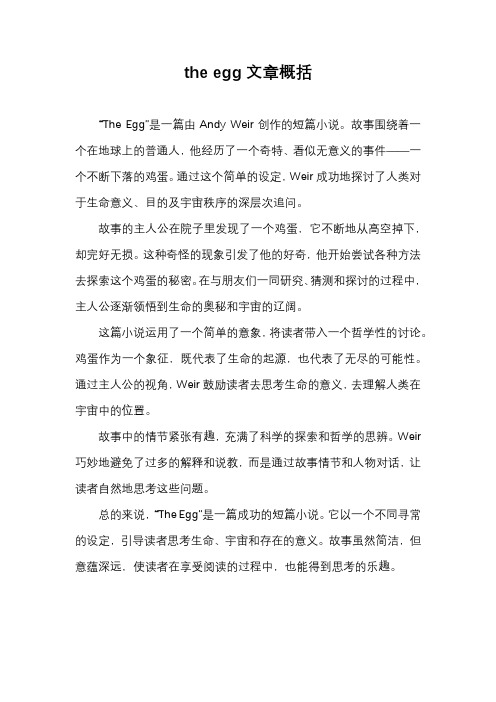
the egg文章概括
“The Egg”是一篇由Andy Weir创作的短篇小说。
故事围绕着一个在地球上的普通人,他经历了一个奇特、看似无意义的事件——一个不断下落的鸡蛋。
通过这个简单的设定,Weir成功地探讨了人类对于生命意义、目的及宇宙秩序的深层次追问。
故事的主人公在院子里发现了一个鸡蛋,它不断地从高空掉下,却完好无损。
这种奇怪的现象引发了他的好奇,他开始尝试各种方法去探索这个鸡蛋的秘密。
在与朋友们一同研究、猜测和探讨的过程中,主人公逐渐领悟到生命的奥秘和宇宙的辽阔。
这篇小说运用了一个简单的意象,将读者带入一个哲学性的讨论。
鸡蛋作为一个象征,既代表了生命的起源,也代表了无尽的可能性。
通过主人公的视角,Weir鼓励读者去思考生命的意义,去理解人类在宇宙中的位置。
故事中的情节紧张有趣,充满了科学的探索和哲学的思辨。
Weir 巧妙地避免了过多的解释和说教,而是通过故事情节和人物对话,让读者自然地思考这些问题。
总的来说,“The Egg”是一篇成功的短篇小说。
它以一个不同寻常的设定,引导读者思考生命、宇宙和存在的意义。
故事虽然简洁,但意蕴深远,使读者在享受阅读的过程中,也能得到思考的乐趣。
舍伍德·安德森《鸡蛋》中美国梦的幻灭

一、简介舍伍德·安德森(1876-1941) 被誉为20 世纪最伟大的美国作家之一,也是现代美国文学的先驱。
出生在美国俄亥俄州的一个小镇,经历了二十世纪初美国从农业社会向工业社会的快速转型,关注商业经济冲击下的小镇生活和人们的精神异化。
他的代表作有《俄亥俄州温斯堡》(1919)、《可怜的怀特》(1920)和《黑暗的笑声》(1925)。
他的作品尽管情节简单零散,结构松散,却有着深刻的意义。
他的故事因使用黑色幽默和微妙的符号而令人印象深刻[ 1](第81 页)。
“鸡蛋”收录在他于1921 年出版的短篇小说选集《鸡蛋的胜利》中。
这个故事集包括14 个独立的故事,共同揭示了20 世纪初人们不得不放弃传统生活方式的社会现实由于工业化浪潮带来的剧变,对物质富裕的向往;因此,许多人在追求物质成功的过程中被疏远了。
这些故事揭示了美国人民不择手段的狂热追求财富的腐败和空虚,对那些不适应社会剧变的受害者表示同情。
因此,人们对20世纪初美国社会大力倡导的美国梦提出质疑和批评。
《鸡蛋》是舍伍德·安德森关于早期工业化浪潮的著名作品之一,经常被选入文学选集。
故事背景是二十世纪头十年左右,在工业化冲击下的美国小镇,新兴的商业社会正在侵蚀人们的传统生活和价值观。
“The Egg”由一个孩子以第一人称讲述他父亲失败的商业冒险。
他的父亲过去过着自给自足的幸福农村生活。
在新时代的冲击下,在妻子的催促下,婚后要“扬帆起航”,父亲放弃了原本简单幸福的生活,追寻成功的梦想,但最终以悲惨收场。
他的父亲首先安排了一场家禽活动,结果很糟糕。
破产后,他的父亲开了一家餐馆,但利润惨淡。
经历了一系列的商业失败,他的父亲最终对他为取悦顾客而做出的荒谬表演感到沮丧。
事实证明,他是愚蠢节目中的蔑视对象。
下面将分析安德森如何用鸡蛋的比喻来揭示虚幻的美国梦。
美国梦被讽刺为通过父亲的悲剧本质上的拜金主义。
他的悲剧表明人们是如何疏远他们腐败的唯物主义成功梦想的。
- 1、下载文档前请自行甄别文档内容的完整性,平台不提供额外的编辑、内容补充、找答案等附加服务。
- 2、"仅部分预览"的文档,不可在线预览部分如存在完整性等问题,可反馈申请退款(可完整预览的文档不适用该条件!)。
- 3、如文档侵犯您的权益,请联系客服反馈,我们会尽快为您处理(人工客服工作时间:9:00-18:30)。
英美小说要素解析指导老师:2013.1.1An analysis of “The Egg”"The Egg", taken from "The Triumph of the Egg", one of Sherwood Anderson's well-known short stories, is a humorous fiction about a farmer who became infected with the American passion for "success" and started to pursue wealth and social position.However, he failed though he made several attempt. This paper tries to analyze the use of the egg as a symbol, the point of view and theme.“The egg ”which used throughout the story symbols three different things. First,“the egg” symbols th e American dream of the father. This story is from Sherwood Anderson's "The Triumph of the Egg", which was published in 1920s when America was experiencing a whole nation transformation from agricultural country into industrial country . At that time, almost the entire nation started the dream of gold rush, pursuing fortune. This man who encouraged by his wife after marrying a country schoolteacher got ambitious. After that, he started his journey of American dream. His first venture of chicken raising turned out badly. Although father made his great effort, chickens became sick and died, which meant the disillusionment of his dream. Second, various monstrous chickens symbols fathers’twisted psychological. Father preserved those grotesques in alchohol and place bottles that chickens was put in on a shelfback of the counter. This behavior indicated that father’ American dream became twisted. Third, the egg symbols cruel reality. Chickens come out of eggs, but they probably born malformed and they can get sick. This equals people who run into obstacles, like the father made his attempt but still could not survive misfortune.The point of view of this artical is the narrrator--the son. It is inevitable that a child’s descpription must be more than the fact.As the narrator wrote:“For some explainable reason I know the story as well as though I had been a witness to my father’s discomfiture.”The narrator did not witness what happened actually, he imaged the part he did not know. This also made the story more real like someonewas telling you about his family story face to face. Furthermore, this point of view began shift at this point for the purpose of flexibly showing different thoughts of father and Joe kane to strenthen the effect of this funny, tragic and hopeless story. What’s more,the humor of narrator brings people a feeling of relax. “I,however, digress”,“I exaggerated a little”, these words shorten the distance between the writer and the reader and give readers more space to think themselves. Besides, this helps figure the son character. Furthermore, narrator’s rhythm of the description controls the structure of story. The narrator uses few words to picture his fathers’ first thirty years. While he uses a number of words to picture the night--the climax.Catabolization is a common theme in modern literature.Because of the coming of industrial age, people can not adjust to the great change from agricultural age, which resulted in catabolization of people.This is exactly what sherwood wanted to show through “The egg”. D riven by American dream, the father made his every attempt. However, various difficulties discouraged his determination and confidence. And gradually, the father became psychologically twist, which is what I mentioned above—catabolization. The pursuit for money is not the best choice, it is the combination of mental and physical aspects that contributes to the real success. In addition, the deceit and falsity of American dream is the other theme of this artical. Chicken eats quantities of corn and meal bou ght by the sweat of the father’s brow but gets diseases; restaurant business gets no great success though the couple work hard; father can not achieve customers’ recognition through his performance. This failure of his performance means his failure of American dream, breaking his hope and illusions. All these disclose that it is difficult to get rid of poverty and low status through hard work in the money-mad metropolis.Sherwood Anderson tells people the value of life and the essence of things through this story. It reveals social crisis that people are meeting with. The author also shows his sympathy for them and his sadness for people who only pursuit money while ignore the rich of mental. The abundant symbolic meanings and unique point of view in the story make it among the classics of American short fiction. It deserves readers deep thought and research.。
